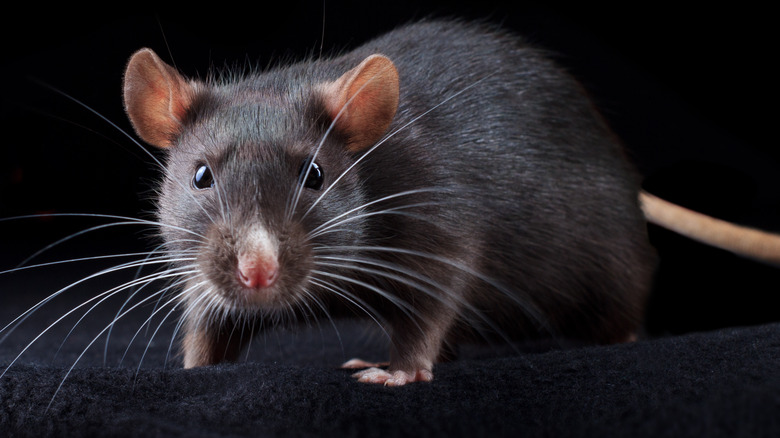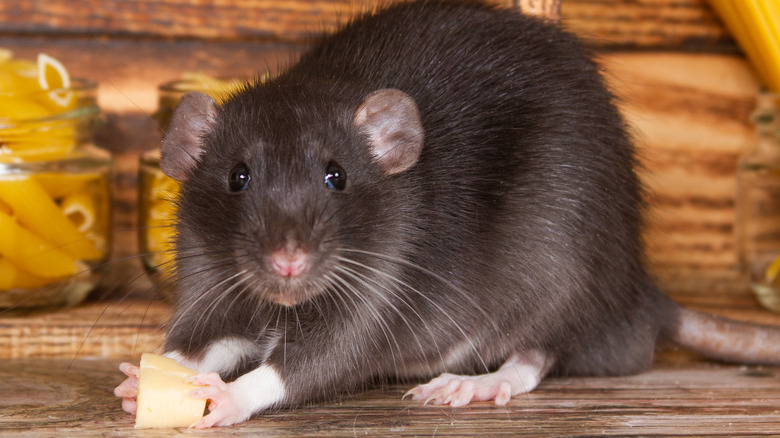Inside Barthelemy De Chasseneuz's Trial Of The Rats
The early modern period of European history gets something of a bad rap for things like inquisitions, witch trials, and religious wars. Roughly since the time of the Enlightenment, historians have looked on it as a backward time when people were controlled by ignorance and fear — and while that's sort of true, it's also somewhat lacking in context. The part that a lot of the naysayers leave out is that the 14th and 15th centuries were a time when it was straight-up miserable to live in Europe, with no one obvious to blame for it. Plague and famine had ravaged the continent, leading to endless widespread poverty and war. With that in mind, it should surprise no one that everyone was looking for someone to blame for their problems, leading to things like witch trials — and even the occasional trial of an animal.
Yep, early modern Europeans occasionally put animals on trial. Often, these were pretty straightforward cases of animals "murdering" humans and being tried in criminal courts; occasionally, though, entire populations of wild animals would be put on trial in ecclesial courts and threatened with "excommunication." And even more interestingly, these trials occasionally proved to be rare instances of compassion and mercy showing through the cracks of the era — often far more mercy than most of us could muster for vermin today. Let's take a look at one possibly apocryphal instance from 16th-century France.
Wait, excommunication for rats?
To start with, trials for animals might not be as absurd as they might seem to the modern reader. After all, animals do occasionally kill people or damage property, and when they do, you have to do something about it — a bull that's killed once might kill again. That said, it could have been an accident, and there are an awful lot of factors to consider when an animal's life is on the line — a poor family might rely on its (murderous) bull for its livelihood, for instance. If it still seems backward, consider that the modern U.S. government frequently sues inanimate objects (via Consumerist).
While charges against individual livestock would be handled by secular courts, things got a bit more complicated when it came to wild animals. It's difficult to bring in a single wild animal to stand trial, and with vermin, the problem was usually with the entire population. Fortunately, the Church had its own courts at the time, and occasionally held its own trials to "excommunicate" pestilence and declare it an "anathema." This was, in practice, mostly a formality whose function was to acknowledge that the locust swarms or whatever were not a gift from God and that people shouldn't feel too bad about exterminating them (via Atlas Obscura).
That all brings us to Autun, France, which in the early 16th century was ravaged by a rat plague — and the brave lawyer who rose to the rats' defense.
The rat trial
First off, there's a good chance this story didn't actually happen. While trials of animals did occasionally occur, we don't have much evidence for the "Trial of the Rats," and most modern historians agree the tale is apocryphal (via The Strong Paw of Reason). Still, it's a great story — just take it with a grain of salt.
The story goes that in Autun, a plague of rats had gotten into the barley crop and eaten the town's livelihood, so a tribunal was called to try and excommunicate the rats. Proclamations were made at all crossroads announcing that the rats had better show up for their court date; but, of course, being rats, they didn't. The tribunal was ready to try them in absentia, but a young, ambitious lawyer named Barthélemy de Chasseneuz stood up. Weren't the rats, he asked, entitled individual representation? And each individual couldn't possibly have heard the summons.
The tribunal begrudgingly agreed and adjourned until a proper summons had been issued. For the next several weeks, parish priests were instructed to announce the summons from every pulpit in Autun. Weeks later, when the tribunal reconvened, and the rats still failed to show, de Chasseneuz stood up again. Is it not, he asked, considered unjust to deny an accused person safe passage to his own trial? The tribunal agreed. Well, he said, you've asked the rats to travel through miles of cat-infested territory and made no effort to ensure their safe passage. The tribunal adjourned again, and apparently never reconvened (via The Vintage News).


